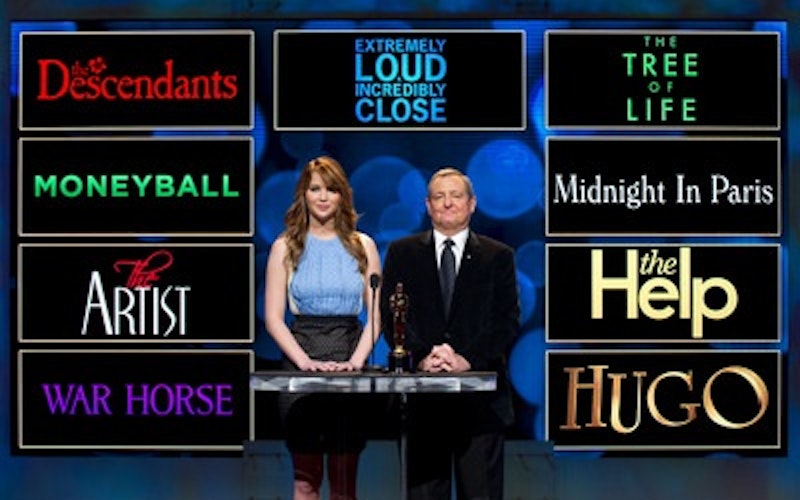
Music
If the Oscars observed Lent
Individually, there is much to admire about almost all of this year’s Best Picture Oscar nominees (sorry, Hugo). Collectively, however, they embrace a willfully naive sense of uplift that seems especially at odds during this Lenten season. The Academy Awards have always emphasized soothing sentimentality over struggle and strife, but this year’s group of candidates raises the level of comfort to anesthetic proportions.
Certainly you’ll find struggle in each of the nine Best Picture nominees; that’s the nature of drama, after all. Yet even those with the most despairing plot elements – racism in The Help, suicide in The Artist, infidelity in The Descendants - end up in happy places. (Folks have complained that they have no idea where The Tree of Life ends up, yet I think we can all agree that the coda on the beach offers images of reconciliation.)
In truth, only two of the nine taint their happy endings with hints of unease. Moneyball offers a personal turning point for its baseball-executive hero, played by Brad Pitt, but hardly a professional one. (The movie’s aversion to fantasy baseball victories is one of its main attributes.) And Steven Spielberg, of all people, allowed the rousing reunion that ends War Horse to carry an echo of loss and grief. Yet these are the exceptions - and mild ones - to the rule.
In fact, could there be a poorer representation of the year we actually experienced in 2011 than this group of Best Picture nominees? Last year witnessed deadly weather, financial distress, global protests, class conflict and increasing political divisiveness. Looking back, one would be hard-pressed to say that there was much to feel comforted about during those 12 months.
There were, of course, many fine movies that reflected this. Yet you won’t find them scooping up gold at Sunday’s ceremony because, as this A.V. Club article points out, any film not toeing the Academy line of insistent optimism was shut out. “These films have ambiguous, difficult endings that suggest the future is uncertain, or threatening, or exactly what it is: a vast unknown,” wrote Tasha Robinson. “This year, at least, that idea is entirely unwelcome in the Best Picture category.”
I feel the need to make room for the discomforting because without it you can’t fully understand Gospel truth.
Looking at my own 2011 top ten list, I find five movies that could be considered troubling and ambiguous: Meek’s Cutoff, Martha Marcy May Marlene, Drive, Take Shelter and Certified Copy. This isn’t just a preference for dark films (The Muppets made my list too). Rather, I feel the need to make room for the discomforting because without it you can’t fully understand Gospel truth.
Lent reminds us of this. In a sense, that’s the purpose of the season: to recognize the suffering that precedes Christ’s triumph. As moviegoers, Christians are inherently drawn to redemption stories, and for good reason. But when redemption stories are the only ones we honor, it’s a bit like rushing past Lent to get to the resurrection. When triumph and reassurance is all we take from God’s story – when we ignore the Fall or gloss over the hard work of Restoration – we miss out on the full, historical reality of God’s Kingdom.
The whole Gospel makes room for suffering, something Paul often acknowledged. While recognizing the miraculous reconciliation that takes place in The Help, we should also make room for the lost-in-desert dismay of Meek’s Cutoff. Remember, we will experience both in this life. In celebrating the loving family that is born of dysfunction in The Descendants, we should also keep in mind that other families, like the one in Take Shelter, wallow under the weight of mental illness. Keep in mind, both families share our pews.
Meek’s Cutoff, Take Shelter - these are the types of films we’d be honoring Sunday if the Oscars were to observe Lent.
What Do You Think?
- Which of the Best Picture nominees have you seen?
- Are there any other films from 2011 that should have been included among the nominees?
- Is it important that we have stories of both struggle and redemption?
Topics: Movies, Culture At Large, Arts & Leisure